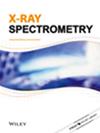X‐ray fluorescence analysis of mercury in human hairs using a secondary target placed behind the sample
IF 1.5
4区 物理与天体物理
Q3 SPECTROSCOPY
引用次数: 0
Abstract
Abstract Mercury is a pollutant that poses a considerable health risk. The concentration of mercury in scalp hair can be used to estimate past mercury exposure. Methods such as atomic absorption spectrophotometry and inductively coupled plasma‐based techniques have been used to determine the concentrations of trace elements in scalp hairs; however, these analytical methods have several limitations, including the need for expensive equipment, complex sample preparation, and large samples of more than 100 hairs. Therefore, simpler and more cost‐effective methods are required. X‐ray fluorescence (XRF) spectroscopy is a simple and fast analytical method. To improve the sensitivity, we applied a secondary target method to enhance the XRF excitation and reduce the background. In conventional secondary target methods, the primary x‐rays irradiate a secondary target of a pure substance, and the sample is then irradiated with the fluorescent x‐rays from the secondary target. We placed high‐purity Y₂O₃ powder, which served as the secondary target, behind the hair samples. The XRF intensities of trace elements such as mercury and zinc in the hair were enhanced by applying the secondary target behind the hair.X射线荧光分析人类头发中的汞使用放置在样品后面的第二个目标
汞是一种对人体健康具有重大危害的污染物。头皮头发中的汞浓度可用于估计过去的汞暴露。原子吸收分光光度法和电感耦合等离子体技术等方法已被用于测定头皮头发中微量元素的浓度;然而,这些分析方法有一些局限性,包括需要昂贵的设备,复杂的样品制备,以及超过100根头发的大样本。因此,需要更简单和更具成本效益的方法。X射线荧光(XRF)光谱是一种简单、快速的分析方法。为了提高灵敏度,我们采用二次靶法增强XRF激发,降低背景。在传统的二次靶法中,初级x射线照射纯物质的次级靶标,然后用次级靶标的荧光x射线照射样品。我们把作为次要目标的高纯度的Y₂O₃粉末放在头发样本后面。在头发后施加二级靶,可提高头发中微量元素汞、锌的XRF强度。
本文章由计算机程序翻译,如有差异,请以英文原文为准。
求助全文
约1分钟内获得全文
求助全文
来源期刊

X-Ray Spectrometry
物理-光谱学
CiteScore
3.10
自引率
8.30%
发文量
38
审稿时长
6-12 weeks
期刊介绍:
X-Ray Spectrometry is devoted to the rapid publication of papers dealing with the theory and application of x-ray spectrometry using electron, x-ray photon, proton, γ and γ-x sources.
Covering advances in techniques, methods and equipment, this established journal provides the ideal platform for the discussion of more sophisticated X-ray analytical methods.
Both wavelength and energy dispersion systems are covered together with a range of data handling methods, from the most simple to very sophisticated software programs. Papers dealing with the application of x-ray spectrometric methods for structural analysis are also featured as well as applications papers covering a wide range of areas such as environmental analysis and monitoring, art and archaelogical studies, mineralogy, forensics, geology, surface science and materials analysis, biomedical and pharmaceutical applications.
 求助内容:
求助内容: 应助结果提醒方式:
应助结果提醒方式:


